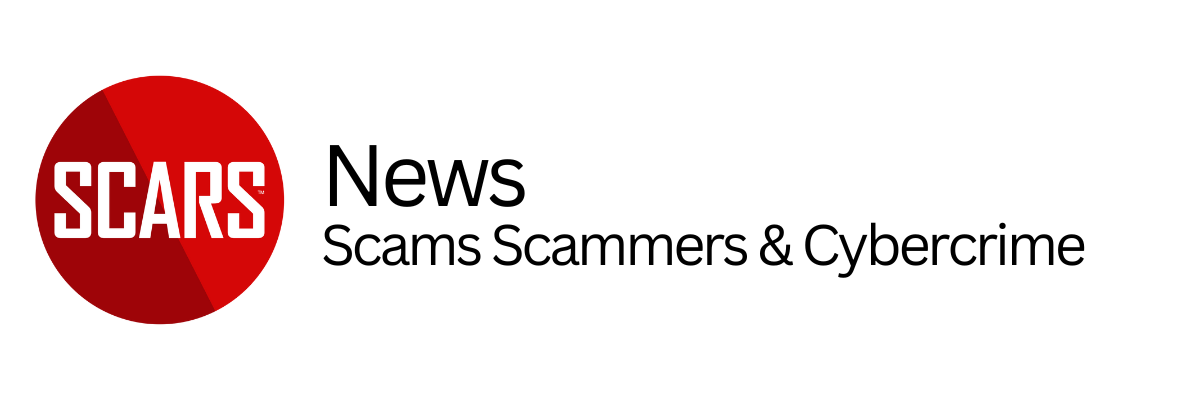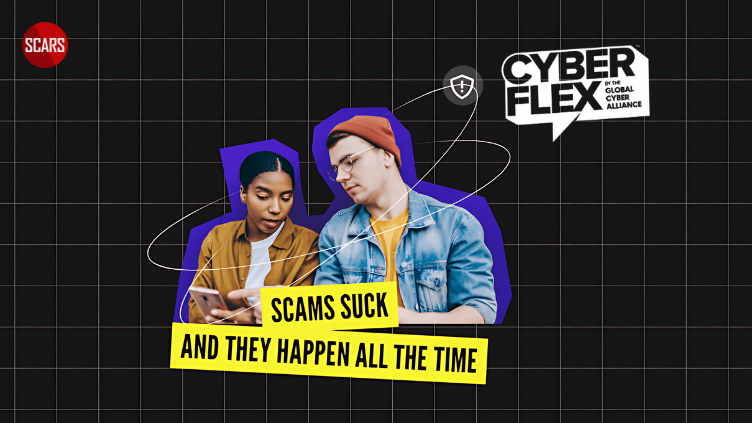Amazon & Global Cyber Alliance Launches CyberFlex to Help Young Adults Avoid Scams and Cybercrime
Creating Better Tools to Help Teens & Young Adults to Stay Safe Online
Primary Category: Scam Victim Advocacy
Author:
• SCARS Editorial Team – Society of Citizens Against Relationship Scams Inc.
About This Article
The Global Cyber Alliance (GCA) and Amazon announced the launch of CyberFlex.org, an innovative website designed to help 18- to 25-year-olds avoid scams and cybercrimes.
CyberFlex.org offers targeted information, free tools, interactive guides, and text alerts to prevent, mitigate, report, and recover from scams and other cyber risks.
By raising awareness and shifting attitudes about online threats, CyberFlex.org provides young adults with practical steps to protect themselves and share their experiences.
Developed with insights from a globally diverse group of young advisors, the platform’s content and messaging are tailored specifically for this age group and delivered on their preferred platforms. Organizations are invited to support and promote CyberFlex.org, contributing to a more secure online environment.

Amazon & Global Cyber Alliance CyberFlex.org: Empowering Teens and Young Adults to Avoid Online Scams and Cybercrime
NEW YORK, NY, 12 June 2024.
The Global Cyber Alliance and Amazon announced the launch of CyberFlex.org, a website that helps 18- to 25-year-olds avoid scams and cybercrimes. CyberFlex contains targeted information including free tools, interactive guides, and text alerts to prevent, mitigate, report, and recover from scams and other cyber risks. CyberFlex aims to raise awareness, shift attitudes about online risks, and provide easy steps to help young adults protect themselves and share their stories.
Developed with insights from a globally diverse group of young advisors, CyberFlex’s themes, content, and messaging are designed specifically for 18- to 25-year-olds and will be delivered on the platforms they use. Like-minded organizations are invited to support, promote, and use CyberFlex.
“We assume ‘digital natives’ can avoid scams and risks online, but data shows the opposite. Instead, they are a growing target for cybercriminals. CyberFlex engages them where they live online and provides valuable resources to build a more trustworthy Internet,” said Brian Cute, GCA’s Chief Operating Officer.
“Scammers that attempt to impersonate trusted brands put consumers of all ages at risk,” said Scott Knapp, Director of Worldwide Buyer Risk Prevention at Amazon. “Amazon is committed to protecting consumers from impersonation scams and is proud to continue our collaboration with the Global Cyber Alliance to provide resources that help young adults identify, avoid, and report scams. Scammers use convincing tactics to reel people in, which is why education around scam avoidance is critical to keeping consumers safe.”
A Global, Collaborative Effort
CyberFlex builds on a GCA and Amazon collaboration to foster consumer education addressing scams among young Internet users globally.
We conducted surveys, focus groups, and independent research on habits, risk perception, and awareness, knowledge, and personal experience with scams. We found that despite young adults’ online experience, they are highly susceptible to impersonation, investment, cryptocurrency scams, and other threats. The data highlighted and validated that young adults are overconfident, confused by scams, do not report incidents, and have growing privacy concerns.
GCA and Amazon will host webinars on June 18 and 26 with end users and industry partners, and a Japanese version of CyberFlex will launch later this year. Organizations interested in helping are urged to contact GCA.
About the Global Cyber Alliance (GCA)
The Global Cyber Alliance (GCA) is an international nonprofit dedicated to building communities to deploy tools, services, and programs that provide cybersecurity at global scale. We achieve this in three ways: working with communities; engaging infrastructure owners and operators; and driving strategic mobilizations for collective action on cybersecurity.
SCARS NOTE: SCARS is a GCA partner organization collaborating on multiple projects to reduce victimization, enhance victims’ support and education, and disrupt the crimes and criminals that cause it.
-/ 30 /-
What do you think about this?
Please share your thoughts in a comment below!
More Related Information:
- CyberFlex | Cybersecurity Tips You Need to Know (gcacyberflex.org)
- GCA and SCARS partnership focused on online scam protection (globalcyberalliance.org)
- GCA, with Support from Amazon, Launches CyberFlex (globalcyberalliance.org)
- Philip Reitinger: “Cybersecurity is a fundamental human right” (globalcyberalliance.org)
- GCA Launches a User-friendly Cybersecurity Tools Wiki (globalcyberalliance.org)
- GCA and Amazon to strengthen scam prevention among young adults (globalcyberalliance.org)
-/ 30 /-
What do you think about this?
Please share your thoughts in a comment below!
SCARS LINKS: AgainstScams.org RomanceScamsNOW.com ContraEstafas.org ScammerPhotos.com Anyscam.com ScamsNOW.com
reporting.AgainstScams.org support.AgainstScams.org membership.AgainstScams.org donate.AgainstScams.org shop.AgainstScams.org
youtube.AgainstScams.org linkedin.AgainstScams.org facebook.AgainstScams.org
TABLE OF CONTENTS
CATEGORIES
![NavyLogo@4x-81[1] Amazon & Global Cyber Alliance Launches CyberFlex to Help Young Adults Avoid Scams and Cybercrime - 2024](https://scamsnow.com/wp-content/uploads/2025/04/NavyLogo@4x-811.png)
ARTICLE META
Important Information for New Scam Victims
- Please visit www.ScamVictimsSupport.org – a SCARS Website for New Scam Victims & Sextortion Victims.
- SCARS Institute now offers its free, safe, and private Scam Survivor’s Support Community at www.SCARScommunity.org – this is not on a social media platform, it is our own safe & secure platform created by the SCARS Institute especially for scam victims & survivors.
- SCARS Institute now offers a free recovery learning program at www.SCARSeducation.org.
- Please visit www.ScamPsychology.org – to more fully understand the psychological concepts involved in scams and scam victim recovery.
If you are looking for local trauma counselors, please visit counseling.AgainstScams.org
If you need to speak with someone now, you can dial 988 or find phone numbers for crisis hotlines all around the world here: www.opencounseling.com/suicide-hotlines
Statement About Victim Blaming
Some of our articles discuss various aspects of victims. This is both about better understanding victims (the science of victimology) and their behaviors and psychology. This helps us to educate victims/survivors about why these crimes happened and not to blame themselves, better develop recovery programs, and help victims avoid scams in the future. At times, this may sound like blaming the victim, but it does not blame scam victims; we are simply explaining the hows and whys of the experience victims have.
These articles, about the Psychology of Scams or Victim Psychology – meaning that all humans have psychological or cognitive characteristics in common that can either be exploited or work against us – help us all to understand the unique challenges victims face before, during, and after scams, fraud, or cybercrimes. These sometimes talk about some of the vulnerabilities the scammers exploit. Victims rarely have control of them or are even aware of them, until something like a scam happens, and then they can learn how their mind works and how to overcome these mechanisms.
Articles like these help victims and others understand these processes and how to help prevent them from being exploited again or to help them recover more easily by understanding their post-scam behaviors. Learn more about the Psychology of Scams at www.ScamPsychology.org
SCARS INSTITUTE RESOURCES:
If You Have Been Victimized By A Scam Or Cybercrime
♦ If you are a victim of scams, go to www.ScamVictimsSupport.org for real knowledge and help
♦ SCARS Institute now offers its free, safe, and private Scam Survivor’s Support Community at www.SCARScommunity.org/register – this is not on a social media platform, it is our own safe & secure platform created by the SCARS Institute especially for scam victims & survivors.
♦ Enroll in SCARS Scam Survivor’s School now at www.SCARSeducation.org
♦ To report criminals, visit https://reporting.AgainstScams.org – we will NEVER give your data to money recovery companies like some do!
♦ Follow us and find our podcasts, webinars, and helpful videos on YouTube: https://www.youtube.com/@RomancescamsNowcom
♦ Learn about the Psychology of Scams at www.ScamPsychology.org
♦ Dig deeper into the reality of scams, fraud, and cybercrime at www.ScamsNOW.com and www.RomanceScamsNOW.com
♦ Scam Survivor’s Stories: www.ScamSurvivorStories.org
♦ For Scam Victim Advocates visit www.ScamVictimsAdvocates.org
♦ See more scammer photos on www.ScammerPhotos.com
You can also find the SCARS Institute’s knowledge and information on Facebook, Instagram, X, LinkedIn, and TruthSocial
Psychology Disclaimer:
All articles about psychology and the human brain on this website are for information & education only
The information provided in this and other SCARS articles are intended for educational and self-help purposes only and should not be construed as a substitute for professional therapy or counseling.
Note about Mindfulness: Mindfulness practices have the potential to create psychological distress for some individuals. Please consult a mental health professional or experienced meditation instructor for guidance should you encounter difficulties.
While any self-help techniques outlined herein may be beneficial for scam victims seeking to recover from their experience and move towards recovery, it is important to consult with a qualified mental health professional before initiating any course of action. Each individual’s experience and needs are unique, and what works for one person may not be suitable for another.
Additionally, any approach may not be appropriate for individuals with certain pre-existing mental health conditions or trauma histories. It is advisable to seek guidance from a licensed therapist or counselor who can provide personalized support, guidance, and treatment tailored to your specific needs.
If you are experiencing significant distress or emotional difficulties related to a scam or other traumatic event, please consult your doctor or mental health provider for appropriate care and support.
Also read our SCARS Institute Statement about Professional Care for Scam Victims – click here
If you are in crisis, feeling desperate, or in despair, please call 988 or your local crisis hotline – international numbers here.
More ScamsNOW.com Articles
A Question of Trust
At the SCARS Institute, we invite you to do your own research on the topics we speak about and publish. Our team investigates the subject being discussed, especially when it comes to understanding the scam victims-survivors’ experience. You can do Google searches, but in many cases, you will have to wade through scientific papers and studies. However, remember that biases and perspectives matter and influence the outcome. Regardless, we encourage you to explore these topics as thoroughly as you can for your own awareness.

























![scars-institute[1] Amazon & Global Cyber Alliance Launches CyberFlex to Help Young Adults Avoid Scams and Cybercrime - 2024](https://scamsnow.com/wp-content/uploads/2025/04/scars-institute1.png)

![niprc1.png1_-150×1501-1[1] Amazon & Global Cyber Alliance Launches CyberFlex to Help Young Adults Avoid Scams and Cybercrime - 2024](https://scamsnow.com/wp-content/uploads/2025/04/niprc1.png1_-150x1501-11.webp)